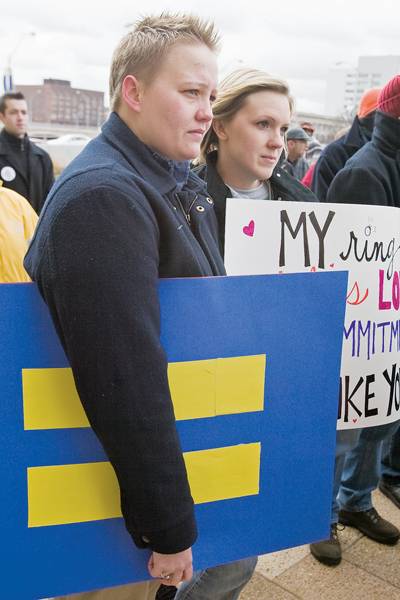HASENMILLER: Got to get you out of my life

Sarah Smith(Jesus Hate) of AnkenyRobbie Adelman(My Son) of UrbandaleLeslie Gearhart(Flag) of Des MoinesPh# 979-8175Jill Jasperson(=) of Des Moines, Student Des Moines University Ph# 218-760-7674withTalia Baxter of Des Moineson Nov. 15, 2008 Photo: Jon Lemons/Iowa State Daily
November 17, 2008
On Nov. 4, three states — California, Arizona and Florida — passed laws banning same-sex marriage.
The one overriding principle that this country was founded upon was that the citizens of America should be free to do whatever they please, as long as their freedoms do not interfere with the freedoms of anyone else. It is this principle that is the basis for our system of limited government and our laissez-faire economic system.
Although we have strayed somewhat from these types of policies in recent times, most politicians still at least pretend that they support them. It may then appear, at first glance, that the statewide bans on same-sex marriage violate this principle. This, however, is not the case. Government legalization of same-sex marriage does not give homosexuals the right to hold a ceremony, walk down the aisle, say “I do,” and kiss the bride — or groom. They already have that right.
Government legalization of same-sex marriage would entitle homosexual couples to the same legal privileges — as well as creating the various bureaucratic costs associated with them — that heterosexual couples have. These costs are passed onto the taxpayers and thus interfere with their freedom to do what they wish with their money. In other words, the freedoms of homosexual couples would be interfering with the freedoms of everyone else. Right now, you are probably thinking, “Doesn’t heterosexual marriage then interfere with peoples’ freedoms as well?” Yes, it does. Government sponsorship of marriage — of any sort — is an imposition on your freedom.
Marriage is a religious, not a legal issue, and should be treated as such. As far as the government is concerned, not only should homosexual marriages be banned, but heterosexual marriages as well.
Marriage, gay or straight, should be taken out of government jurisdiction and left to the religious sector. Or, for those who prefer it, left as a non-religious ceremony, since you don’t need a church’s endorsement to say that you’re married, just as you shouldn’t need the government’s. Since this will most likely not happen in the near future, however, something needs to be said to both sides of the gay-marriage debate.
To the anti-gay marriage crowd: You often cite the Bible’s condemnation of homosexuality as the basis of your opposition to same-sex marriage. You feel the need to impose your morals and your religion on the rest of the population. However, when it comes to any other issue, this is no longer the case. When was the last time you lobbied for a law forcing people to keep holy the Sabbath, for example? Of course, the very idea of laws for keeping holy the Sabbath would seem absurd in America because it would be imposing on the freedoms of someone else, which, in this country, is not something we have the right to do.
But for some reason, when it comes to homosexuality, a large portion of the population forgets this principle, which they are perfectly capable of applying to everything else. While it is true that you have every right to attempt to convince individuals to follow the ways of your religion, you do not have any right, whatsoever, to force them to. Also, if you are going to find one particular sin to be extra picky about, you could try finding one that doesn’t tend to occur because of one person’s love for another.
And to the pro-gay marriage crowd: A heterosexual is allowed to marry someone of the opposite sex, but not someone of the same sex. A homosexual is also allowed to marry someone of the opposite sex, but not someone of the same sex.
If x equals the rights of heterosexuals, y equals the rights of homosexuals, and z equals the right to marry someone of the opposite, but not the same sex, then x equals z and y equals z. Therefore, x equals y. The rights of heterosexuals and homosexuals are equal. In mathematics, we call this the transitive property. Additionally, the fact that homosexuals are not inclined to take advantage of their right to marry someone of the opposite sex does not entitle them to a different right of their choosing. Nowhere in the Constitution will you find a clause that says those who do not exercise their rights get special rights of their own.
The laws concerning marriage that have been created over the years pertain to circumstances that arise between a man and a woman. It would be unwise to automatically apply these exact same laws to a completely different set of circumstances. It would be like redefining murder to include poaching. Just because you now call poaching murder doesn’t mean you should adopt the exact same punishments for those who hunt an endangered species as for those who kill productive members of our society.
Regardless of your side of the debate, however, the solution is simply to keep the government out of the marriage business entirely.






